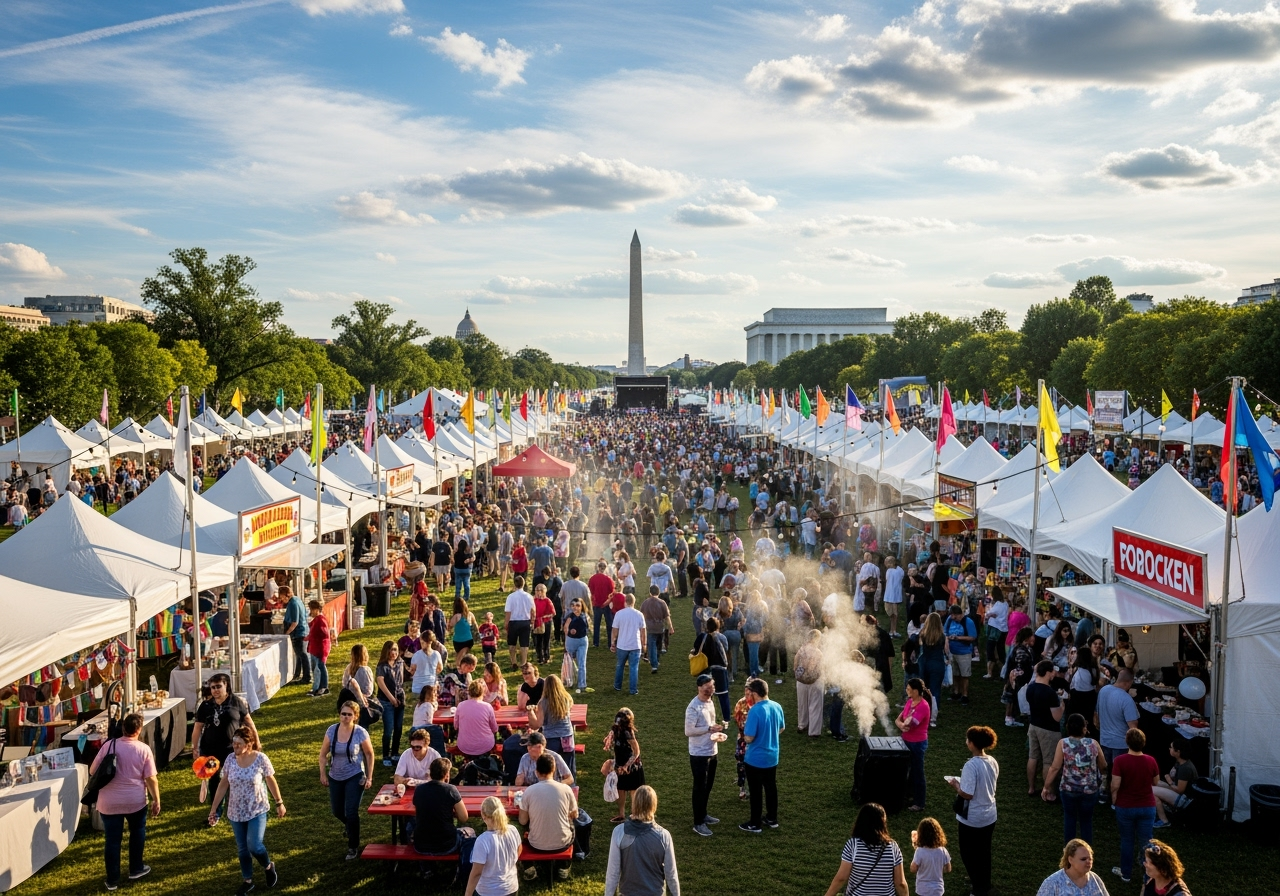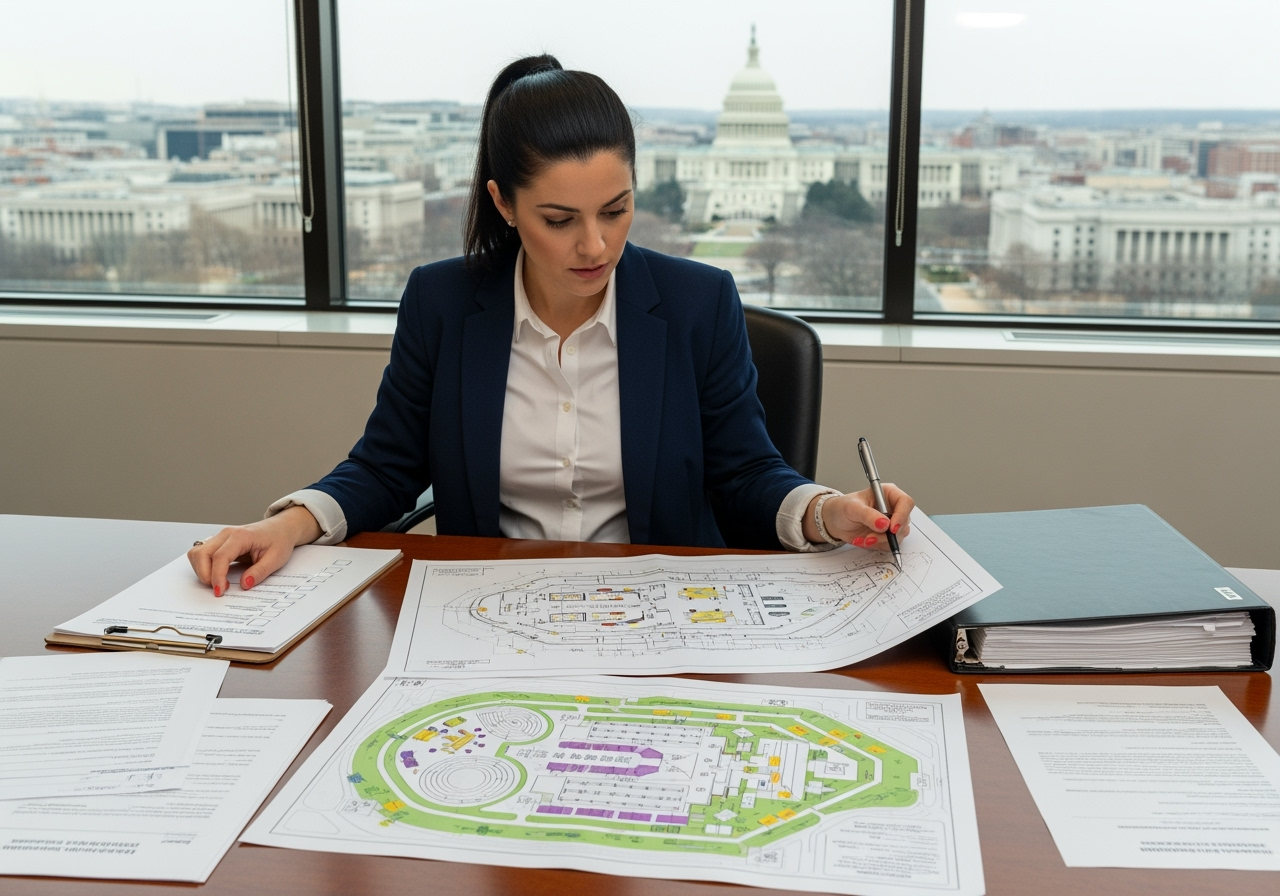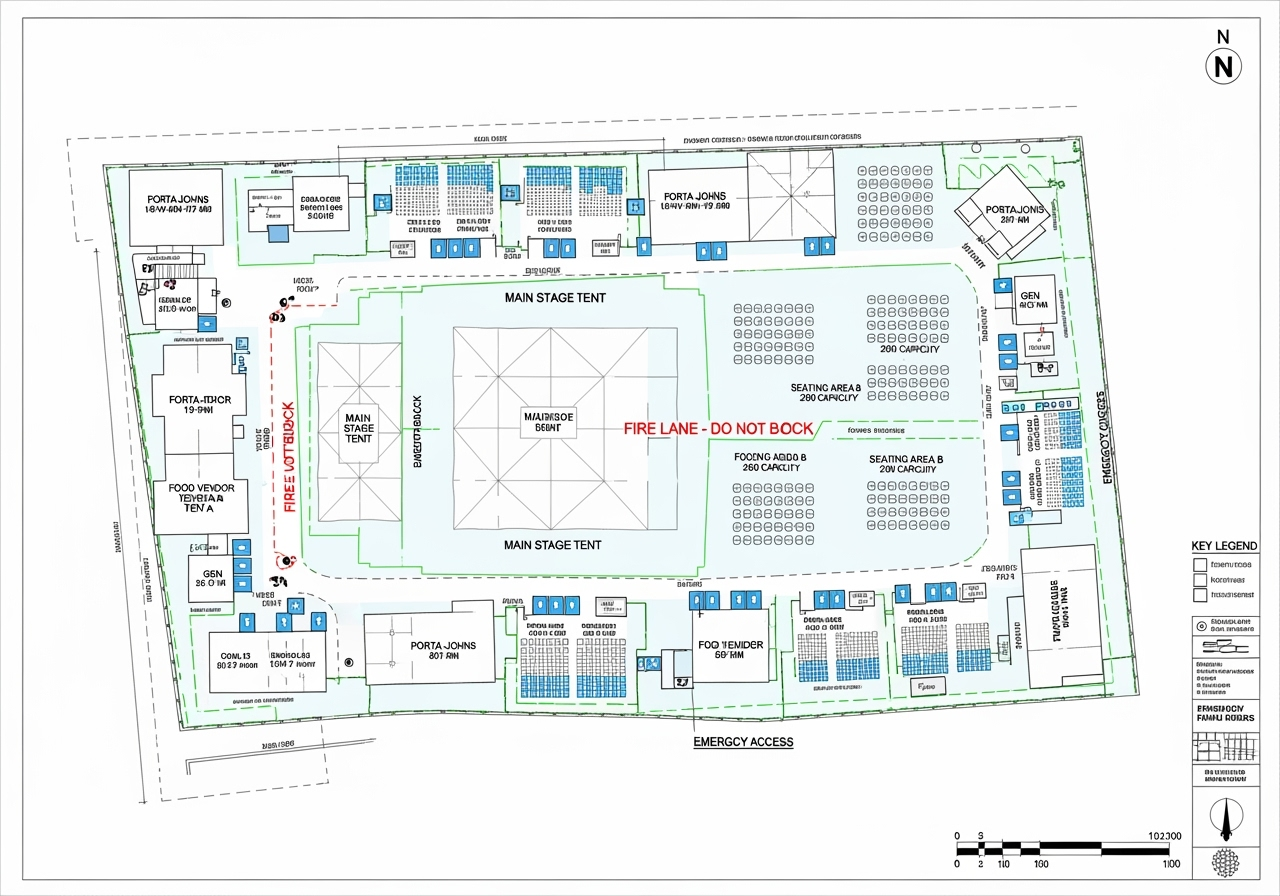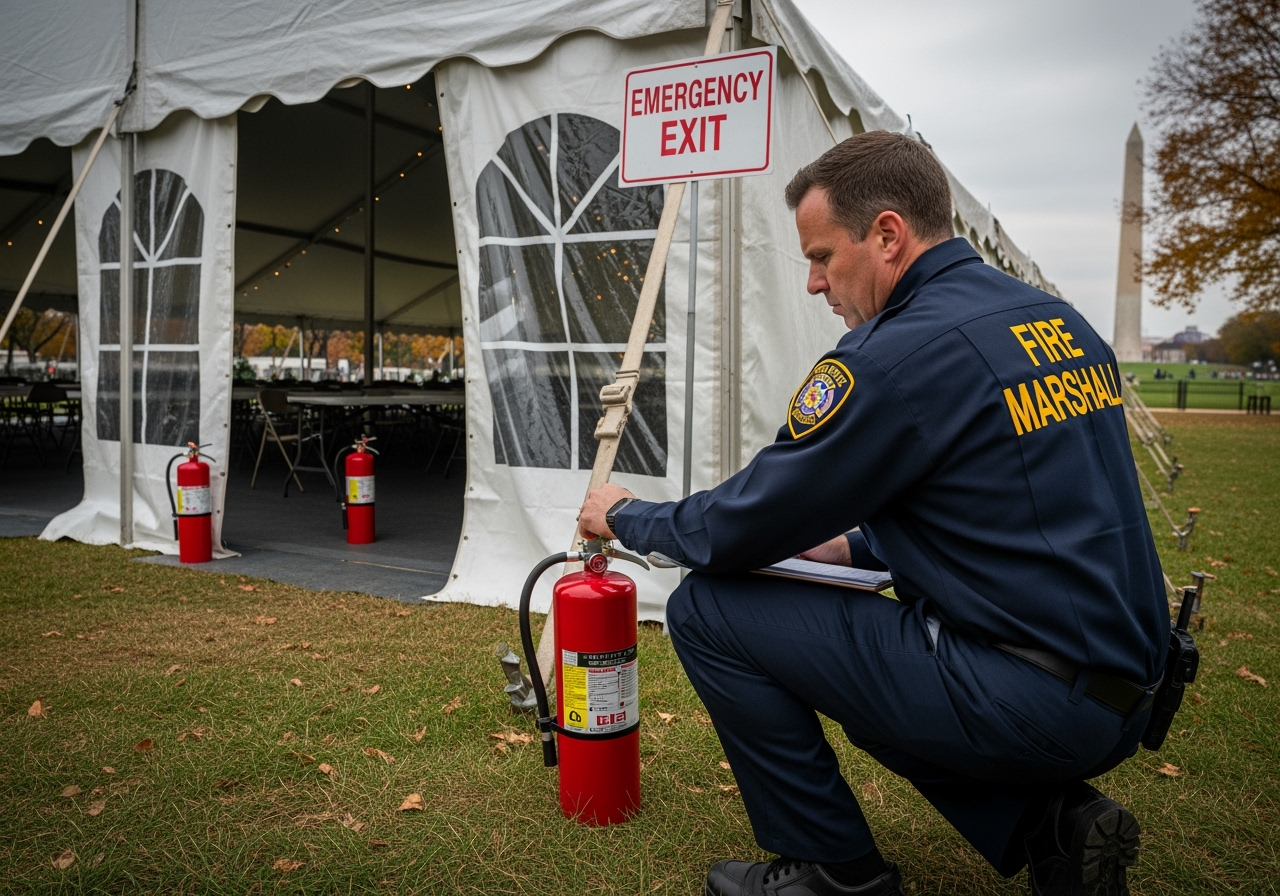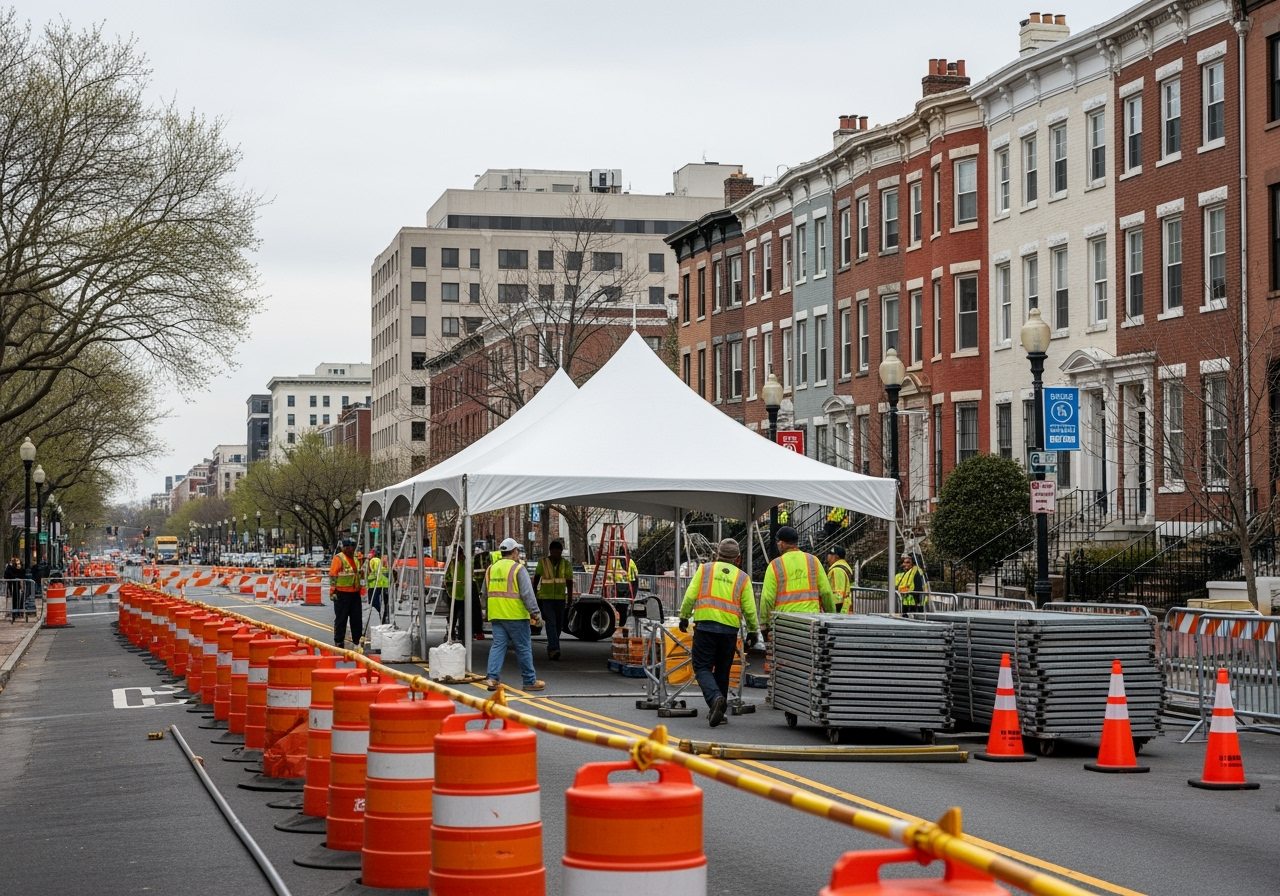Complete Guide to Washington, DC Special Event Permits 2025
Planning a special event in Washington D.C.? Whether you're organizing a community festival, corporate gathering, wedding reception, or street fair, understanding DC special event permit requirements is crucial for a successful event. This comprehensive 2025 guide walks you through everything you need to know about securing special event permits in the nation's capital.
What is a DC Special Event Permit?
A DC special event permit is required for temporary gatherings and activities conducted on private or public property that fall outside normal operations. According to D.C. Municipal Regulations Title 19, Chapter 13, special events include activities such as:
Circuses, rodeos, carnivals, and fairs
Performances, concerts, and musical events
Dancing and entertainment gatherings
Public speaking, preaching, or lectures
Events in tents or temporary structures
Activities on vacant land or yards
If your event involves temporary structures, large crowds, street closures, or public space usage, you'll likely need a special event permit.
Who Needs a Special Event Permit?
Events Requiring Permits:
Community festivals and neighborhood celebrations
Corporate events held outdoors or in temporary structures
Weddings and receptions using tents or public spaces
Concerts and performances with amplified sound
Food festivals and farmers markets
Sporting events and races
Block parties requiring street closures
Fundraising events in public areas
When Permits May Not Be Required:
Small private gatherings on private property
Events entirely within licensed venues
Activities not using public space or temporary structures
Gatherings under 50 people without amplification
Pro Tip: When in doubt, contact the DC Department of Buildings Special Events Division early in your planning process to determine if your event requires a permit.
DC Special Event Permit Timeline and Fees
Application Timeline (Critical for Planning):
Standard Processing (29+ days before event)
Base fee: $330
Recommended timeline: 45-60 days before event
Allows time for community consent and revisions
Expedited Processing (15-29 days before event)
Base fee: $330 + $100 expedited fee
Total: $430
Higher risk of complications
Rush Processing (Less than 14 days before event)
Base fee: $330 + $200 expedited fee
Total: $530
Significant risk of delays or denial
Not recommended for complex events
Additional Costs to Consider:
Fire Marshall review fees
Street closure permits (DDOT)
Public space rental fees
Insurance requirements ($1-2 million liability)
Tent and structure permits
Alcoholic beverage licenses (if applicable)
Step-by-Step DC Special Event Permit Process
Phase 1: Pre-Application Planning (4-6 weeks before submission)
1. Define Your Event
Confirm dates, times, and location
Estimate attendance numbers
Identify all activities and structures needed
Determine if alcohol will be served
2. Request Location Information
Contact DOB Special Events Division
Request map of properties within 300 feet of event site
Obtain list of resident and business addresses
This information is essential for community consent
3. Assess Additional Permits Needed
Street closure permits (DDOT)
Public space occupancy
Tent and temporary structure permits
Sound amplification permits
Food service permits
Phase 2: Community Consent (3-4 weeks before submission)
Critical Requirement: You must obtain signature consent from 75% of resident households and businesses within 300 feet of your event location.
Community Consent Process:
Use the map and address list from DOB
Create a clear event description for neighbors
Go door-to-door collecting signatures
Document all consent attempts
Submit signatures to Special Events Division minimum 10 business days before your event
Common Challenges:
Vacant properties or absent owners
Businesses with irregular hours
Residents who are difficult to reach
Language barriers
Pro Tip: Start community consent collection immediately. This is often the most time-consuming part of the permit process and cannot be rushed.
Phase 3: Site Plan Development (2-3 weeks before submission)
You must prepare four (4) detailed site plans of your entire event area. Each plan must include:
Required Site Plan Elements:
Event name, date(s), and location
All temporary structures (tents, stages, booths)
20-foot fire lane (pre-approved by Fire Marshall)
Generator locations with wattage specifications
Porta-johns and handwashing stations
Fire hydrant locations
Fencing and barriers
Bleachers and seating arrangements
Parking and traffic flow
Emergency vehicle access
Detailed Ledger/Key Must Include:
Specific use of each tent or structure
Tent dimensions and whether open or closed
Table and chair arrangements with occupancy loads
Generator fuel type (DIESEL ONLY)
Note: "No refueling onsite"
Note: "No cooking under tents" (if applicable)
All safety equipment locations
Phase 4: Fire Marshall Approval (Before DOB Submission)
Critical Step: You must obtain Office of the Fire Marshall approval before submitting your application to the Department of Buildings Permit Center.
Fire Marshall Reviews:
20-foot fire lane placement and access
Any structures placed in streets
Tent and stage safety compliance
Emergency egress routes
Fire extinguisher placement
Occupancy load calculations
Contact: Office of the Fire Marshall, Fire Prevention Division
Phase 5: Application Submission
Complete Application Package Includes:
Fully completed special event application
Four (4) detailed site plans with ledger
Community consent signatures (75% minimum)
Fire Marshall approval letter
Proof of insurance ($1-2 million liability)
Street closure request (if applicable)
Additional permit applications (tents, alcohol, etc.)
Submission Location: DC Department of Buildings, Special Events Division
Phase 6: Review and Approval (2-4 weeks)
Once submitted, your application goes through:
Completeness review (3-5 business days)
Multi-agency coordination review
Site plan technical review
Community impact assessment
Final approval or revision requests
Be Prepared For:
Requests for additional information
Site plan revisions
Additional safety requirements
Coordination meetings with city agencies
Phase 7: Final Preparations (1-2 weeks before event)
After Approval:
Schedule final inspections
Coordinate with all vendors
Confirm insurance coverage
Review emergency procedures
Prepare permit display for event site
Conduct safety walkthrough
Special Considerations for DC Special Events
Street Closures and Public Space
If your event requires street closures or public right-of-way usage:
Department of Transportation (DDOT) Requirements:
Separate street closure application
Traffic control plan
Detour route planning
Public notification requirements
Coordination with nearby businesses
Emergency vehicle access maintenance
Timeline: Submit DDOT applications simultaneously with your special event permit, as processing can take 4-6 weeks.
Alcoholic Beverage Service
Serving alcohol at your special event requires additional licensing:
ABCA (Alcoholic Beverage and Cannabis Administration) Process:
Obtain acknowledgement signature from DOB Special Events Division
Submit ABC license application to ABCA
Allow 30-45 days for processing
Ensure servers have proper training/certification
Contact:
ABCA: 2000 14th Street, NW, S400, Washington, DC 20009
Phone: (202) 442-4423
Email: abca@dc.gov
Tents and Temporary Structures
Large tents and structures require separate building permits:
Tent Permit Requirements:
Structural engineering plans for tents over 400 sq ft
Anchoring specifications
Fire safety compliance
Exit capacity calculations
Weather contingency plans
Historic District Events
Events in DC's historic districts face additional scrutiny:
Historic Preservation Requirements:
Historic Preservation Review Board approval
Restrictions on structure types and colors
Enhanced documentation requirements
Limitations on ground penetration for anchoring
Accelerated removal timelines
Amplified Sound
Events with amplified sound may need additional permits:
Sound Permit Considerations:
Decibel level restrictions
Time-of-day limitations
Proximity to residential areas
Noise monitoring requirements
Common DC Special Event Permit Mistakes
1. Insufficient Lead Time
Problem: Applying too close to event date Solution: Start planning 60-90 days in advance
2. Incomplete Community Consent
Problem: Not reaching 75% threshold or submitting too late Solution: Begin consent collection immediately; allow 3-4 weeks
3. Missing Fire Marshall Approval
Problem: Submitting to DOB without Fire Marshall sign-off Solution: Schedule Fire Marshall review before DOB submission
4. Inadequate Site Plans
Problem: Missing required elements or insufficient detail Solution: Use professional site plan services; include all required elements
5. Underestimating Insurance Needs
Problem: Insufficient coverage or missing endorsements Solution: Contact insurance provider early; confirm DC requirements
6. Ignoring Multi-Agency Coordination
Problem: Focusing only on DOB permit while neglecting DDOT, ABCA, etc. Solution: Create comprehensive permit checklist covering all agencies
7. Poor Weather Contingency Planning
Problem: No backup plan for severe weather Solution: Include detailed contingency plans in application
Tips for Successful DC Special Event Permits
Start Early
The single most important factor in permit success is time. Begin planning at least 60 days before your event, preferably 90 days for complex events.
Build Agency Relationships
Establish communication with key contacts at:
DOB Special Events Division
Office of the Fire Marshall
DDOT (if street closures needed)
ABCA (if serving alcohol)
Document Everything
Keep detailed records of:
All communications with agencies
Community consent attempts
Site plan revisions
Insurance certificates
Vendor contracts and certifications
Hire Professionals When Needed
Consider professional permit expediting services for:
Site plan development
Community consent collection
Multi-agency coordination
Complex events with multiple permits
Plan for Contingencies
Always have backup plans for:
Weather emergencies
Lower-than-expected attendance
Vendor cancellations
Last-minute permit conditions
Resources and Contacts
Key DC Government Agencies
Department of Buildings - Special Events Division
Primary permit authority
Community consent coordination
Site plan review
Office of the Fire Marshall
Fire safety approvals
Structure placement review
Emergency access planning
Department of Transportation (DDOT)
Street closure permits
Traffic control plans
Public right-of-way usage
Alcoholic Beverage and Cannabis Administration (ABCA)
Phone: (202) 442-4423
Email: abca@dc.gov
Address: 2000 14th Street, NW, S400, Washington, DC 20009
DC Inspector General Hotline
Report fraud, waste, or abuse
Phone: 202-727-0267 or 1-800-521-1639
Why Work with M.C.G. Permit Consultants?
Navigating DC's special event permit process can be overwhelming, especially when coordinating multiple agencies, collecting community consent, and meeting tight deadlines. With over 25 years of experience expediting permits in Washington D.C., M.C.G. Permit Consultants brings unmatched local expertise to your special event.
Our Special Event Services Include:
Complete permit application preparation and submission
Community consent collection coordination
Professional site plan development
Fire Marshall approval facilitation
Multi-agency coordination (DOB, DDOT, ABCA, Fire Marshall)
Real-time permit tracking and updates
Expedited processing when time is critical
On-site inspection coordination
Why Choose M.C.G.?
25+ years of D.C. permitting experience
Direct relationships with city officials and agencies
Proven track record with special events of all sizes
Personal, owner-level service on every project
Transparent flat-fee pricing
Real-time project tracking via Onehub
Conclusion
Securing a DC special event permit in 2025 requires careful planning, attention to detail, and adequate lead time. The key to success is understanding the multi-agency coordination required, starting early, and ensuring complete documentation.
Remember these critical success factors:
Start 60-90 days before your event
Obtain 75% community consent early
Get Fire Marshall approval before DOB submission
Prepare detailed, complete site plans
Coordinate with all relevant agencies
Maintain comprehensive insurance coverage
With proper planning and the right expertise, your special event can proceed smoothly and successfully in Washington D.C.
Ready to Streamline Your DC Special Event Permit?
Don't let permit complexity derail your event plans. Let M.C.G. Permit Consultants handle the bureaucratic maze while you focus on creating an unforgettable experience.
Contact M.C.G. Permit Consultants Today:
📞 Phone: (202) 729-8272
✉️ Email: sayhello@mcgpermits.com
🌐 Website: www.mcgpermits.com
M.C.G. Permit Consultants, LLC
Washington, D.C.
Simply Getting it Done.
This guide provides general information about DC special event permit requirements as of 2025. Specific requirements may vary based on your event's unique circumstances. Always consult with DC government agencies or qualified permit expediting professionals for project-specific guidance.

